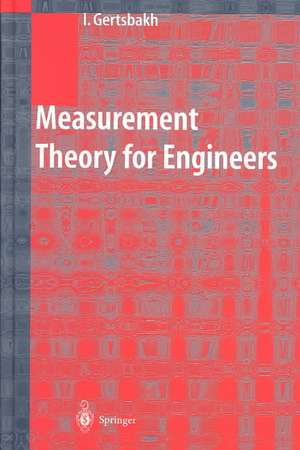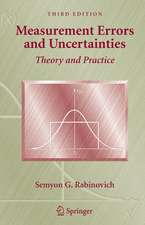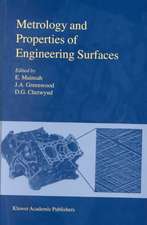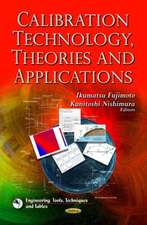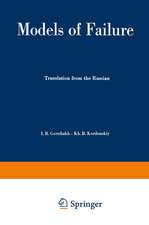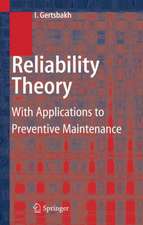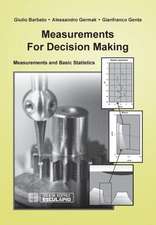Measurement Theory for Engineers
Autor Ilya Gertsbakhen Limba Engleză Hardback – 21 mai 2003
| Toate formatele și edițiile | Preț | Express |
|---|---|---|
| Paperback (1) | 380.84 lei 6-8 săpt. | |
| Springer Berlin, Heidelberg – 30 noi 2010 | 380.84 lei 6-8 săpt. | |
| Hardback (1) | 388.13 lei 6-8 săpt. | |
| Springer Berlin, Heidelberg – 21 mai 2003 | 388.13 lei 6-8 săpt. |
Preț: 388.13 lei
Nou
Puncte Express: 582
Preț estimativ în valută:
74.28€ • 77.26$ • 61.32£
74.28€ • 77.26$ • 61.32£
Carte tipărită la comandă
Livrare economică 14-28 aprilie
Preluare comenzi: 021 569.72.76
Specificații
ISBN-13: 9783540000815
ISBN-10: 354000081X
Pagini: 168
Ilustrații: XIII, 150 p.
Dimensiuni: 155 x 235 x 15 mm
Greutate: 0.42 kg
Ediția:2003
Editura: Springer Berlin, Heidelberg
Colecția Springer
Locul publicării:Berlin, Heidelberg, Germany
ISBN-10: 354000081X
Pagini: 168
Ilustrații: XIII, 150 p.
Dimensiuni: 155 x 235 x 15 mm
Greutate: 0.42 kg
Ediția:2003
Editura: Springer Berlin, Heidelberg
Colecția Springer
Locul publicării:Berlin, Heidelberg, Germany
Public țintă
GraduateCuprins
1 Introduction.- 2 Mean and Standard Deviation.- 3 Comparing Means and Variances.- 4 Sources of Uncertainty: Process and Measurement Variability.- 5 Measurement Uncertainty: Error Propagation Formula.- 6 Calibration of Measurement Instruments.- 7 Collaborative Studies.- 8 Measurements in Special Circumstances.- Answers and Solutions to Exercises.- Appendix A: Normal Distribution.- Appendix B: Quantiles of the Chi-Square Distribution.- Appendix C: Critical Values of the F—distribution.- References.
Recenzii
From the reviews:
"This textbook deals with the principal issues of measurement theory. Each topic starts with an informal introduction followed by an example, the rigorous problem formulation, solution method, and a detailed numerical solution. … This book is intended as a text for graduate students and a reference for researchers and industrial experts specializing in measurement data analysis for quality control and industrial process improvement." (Ivan Krivý, Zentralblatt MATH, Vol. 1018, 2003)
"This textbook deals with the principal issues of measurement theory. Each topic starts with an informal introduction followed by an example, the rigorous problem formulation, solution method, and a detailed numerical solution. … This book is intended as a text for graduate students and a reference for researchers and industrial experts specializing in measurement data analysis for quality control and industrial process improvement." (Ivan Krivý, Zentralblatt MATH, Vol. 1018, 2003)
Textul de pe ultima copertă
The emphasis of this textbook is on industrial applications of Statistical Measurement Theory. It deals with the principal issues of measurement theory, is concise and intelligibly written, and to a wide extent self-contained. Difficult theoretical issues are separated from the mainstream presentation. Each topic starts with an informal introduction followed by an example, the rigorous problem formulation, solution method, and a detailed numerical solution. Each chapter concludes with a set of exercises of increasing difficulty, mostly with solutions. The book is meant as a text for graduate students and a reference for researchers and industrial experts specializing in measurement and measurement data analysis for quality control, quality engineering and industrial process improvement using statistical methods. Knowledge of calculus and fundamental probability and statistics is required for the understanding of its contents.
Caracteristici
Brief but plain introduction into measurement theory Based on lectures for students in industrial engineering Most of the chapters are followd by exercises Includes supplementary material: sn.pub/extras
